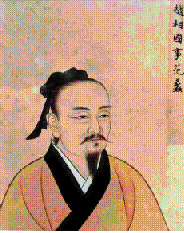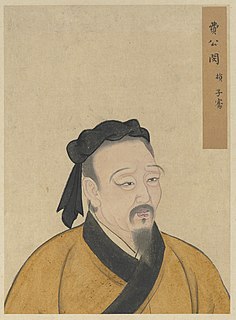 W
WBu Shang, commonly known by his courtesy name Zixia or as Buzi, was an ancient Chinese philosopher and a prominent disciple of Confucius who was considered one of the most accomplished in cultural learning. He was one of the five disciples who took chief responsibility for the transmission of Confucius' teachings. He played a significant role in the transmission of such classics as the Book of Poetry and the I Ching. He established his own school, and taught Marquess Wen of Wei, ruler of Wei, the most powerful state of the early Warring States period.
 W
WConfucius was a Chinese philosopher and politician of the Spring and Autumn period who was traditionally considered the paragon of Chinese sages.
 W
WDuanmu Ci, also known by his courtesy name Zigong, was a Chinese businessman, philosopher, and politician. He was one of the most important and loyal disciples of Confucius. Among Confucius' students, he was the second best at speech, after only Zai Yu. He was a prominent diplomat of the Spring and Autumn period who served as a high official in several states, and was a very wealthy businessman.
 W
WFan Li from the Spring and Autumn period, was an ancient Chinese military strategist, politician, and businessman. Fàn Li was an important political and military advisor to Goujian, the king of Yue. He became known as Tao Zhu Gong (陶朱公) which he took after achieving a decisive victory for Yue over the state of Wu and retiring to live a secluded life with his wife Xi Shi, one of the most famous beauties in Chinese history.
 W
WLu Ban was a Chinese structural engineer, inventor, and carpenter during the Zhou Dynasty. He is revered as the Chinese Deity (Patron) of builders and contractors.
 W
WMin Sun, also known by his courtesy name Ziqian, was one of the most prominent disciples of Confucius. Confucius considered Min his second best disciple after Yan Hui, and commended him for his filial piety. His legend is included in the Confucian text The Twenty-four Filial Exemplars.
 W
WLady Nanzi (南子), also called Nan Zi and Wei Ling Nazi, was a Chinese ruler, the Duchess consort of Duke Ling of Wey, and ruler of Wey in the place of her spouse, who was disinterested in politics.
 W
WRan Qiu, also known by his courtesy name Ziyou and as Ran You, was a leading disciple of Confucius. Among Confucius's disciples, he was the foremost in terms of ability and accomplishment in statesmanship. As a military commander of the State of Lu, he repelled an invasion from the neighbouring State of Qi. His influence in Lu facilitated the return of Confucius to his native state after fourteen years of exile.
 W
WRan Yong, also known by his courtesy name Zhonggong, was one of the prominent disciples of Confucius. Confucius thought highly of his excellent moral conduct, and considered him fit to be the ruler of a state. After completing school, he served as chief officer of Jisun, the noble clan that dominated the politics of Lu.
 W
WSun Tzu was a Chinese general, military strategist, writer and philosopher who lived in the Eastern Zhou period of ancient China. Sun Tzu is traditionally credited as the author of The Art of War, an influential work of military strategy that has affected both Western and East Asian philosophy and military thinking. His works focus much more on alternatives to battle, such as stratagem, delay, the use of spies and alternatives to war itself, the making and keeping of alliances, the uses of deceit and a willingness to submit, at least temporarily, to more powerful foes. Sun Tzu is revered in Chinese and East Asian culture as a legendary historical and military figure. His birth name was Sun Wu and he was known outside of his family by his courtesy name Changqing. The name Sun Tzu by which he is best known in the Western World is an honorific which means "Master Sun".
 W
WWu Yun, better known by his courtesy name Zixu, was a general and politician of the Wu kingdom in the Spring and Autumn period. Since his death, he has evolved into a model of loyalty in Chinese culture. He is the best known historical figure with the Chinese family name "Wu" (伍). All branches of the Wu clan claim that he was their "first ancestor".
 W
WXi Shi was, according to legends, one of the renowned Four Beauties of ancient China. She was said to have lived during the end of the Spring and Autumn period in Zhuji, the capital of the ancient State of Yue.
 W
WYan Hui was the favorite disciple of Confucius and one of the most revered figures of Confucianism. He is venerated in Confucian temples as one of the Four Sages.
 W
WYan Yan, also known by his courtesy name Ziyou and as Yan You or Yanzi, was a prominent disciple of Confucius, considered by Confucius to be his most distinguished disciple in the study of the classics. A native of the state of Wu, he was the only known southerner among Confucius' disciples.
 W
WZai Yu, also known by his courtesy name Ziwo and as Zai Wo, was a prominent disciple of Confucius, known for his gift in speech. However, Confucius severely criticized him for proposing to shorten the three-year mourning period after the death of a parent.
 W
WZeng Shen, better known as Zengzi, courtesy name Ziyu (子輿), was a Chinese philosopher and disciple of Confucius. He later taught Zisi, the grandson of Confucius, who was in turn the teacher of Mencius, thus beginning a line of transmitters of orthodox Confucian traditions. He is revered as one of the Four Sages of Confucianism.
 W
WZhong You, commonly known by his courtesy names Zilu and Jilu, was one of the best known and most faithful disciples of Confucius. Among Confucius's disciples, he was the second in terms of ability and accomplishment in statesmanship, after Ran Qiu. He was noted for his valour and sense of justice, but Confucius often warned him against acting without forethought. He was killed in the State of Wey in defence of his lord Kong Kui.